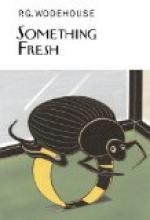It had. The card which announced that here was an Egyptian scarab of the reign of Cheops of the Fourth Dynasty, presented by J. Preston Peters, Esquire, still lay on the cabinet in its wonted place; but now its neat lettering was false and misleading. The scarab was gone.
* * *
For all that he had expected this, for all his premonition of disaster, it was an appreciable time before the Efficient Baxter rallied from the blow. He stood transfixed, goggling at the empty place.
Then his mind resumed its functions. All, he perceived, was not yet lost. Baxter the watchdog must retire, to be succeeded by Baxter the sleuthhound. He had been unable to prevent the theft of the scarab, but he might still detect the thief.
For the Doctor Watsons of this world, as opposed to the Sherlock Holmeses, success in the province of detective work must always be, to a very large extent, the result of luck. Sherlock Holmes can extract a clew from a wisp of straw or a flake of cigar ash; but Doctor Watson has to have it taken out for him and dusted, and exhibited clearly, with a label attached.
The average man is a Doctor Watson. We are wont to scoff in a patronizing manner at that humble follower of the great investigator; but as a matter of fact we should have been just as dull ourselves. We should not even have risen to the modest height of a Scotland Yard bungler.
Baxter was a Doctor Watson. What he wanted was a clew; but it is so hard for the novice to tell what is a clew and what is not. And then he happened to look down—and there on the floor was a clew that nobody could have overlooked.
Baxter saw it, but did not immediately recognize it for what it was. What he saw, at first, was not a clew, but just a mess. He had a tidy soul and abhorred messes, and this was a particularly messy mess. A considerable portion of the floor was a sea of red paint. The can from which it had flowed was lying on its side—near the wall. He had noticed that the smell of paint had seemed particularly pungent, but had attributed this to a new freshet of energy on the part of Lord Emsworth. He had not perceived that paint had been spilled.
“Pah!” said Baxter.
Then suddenly, beneath the disguise of the mess, he saw the clew. A footmark! No less. A crimson footmark on the polished wood! It was as clear and distinct as though it had been left there for the purpose of assisting him. It was a feminine footmark, the print of a slim and pointed shoe.
This perplexed Baxter. He had looked on the siege of the scarab as an exclusively male affair. But he was not perplexed long. What could be simpler than that Mr. Peters should have enlisted female aid? The female of the species is more deadly than the male. Probably she makes a better purloiner of scarabs. At any rate, there the footprint was, unmistakably feminine.
Inspiration came to him. Aline Peters had a maid! What more likely than that secretly she should be a hireling of Mr. Peters, on whom he had now come to look as a man of the blackest and most sinister character? Mr. Peters was a collector; and when a collector makes up his mind to secure a treasure, he employs, Baxter knew, every possible means to that end.




